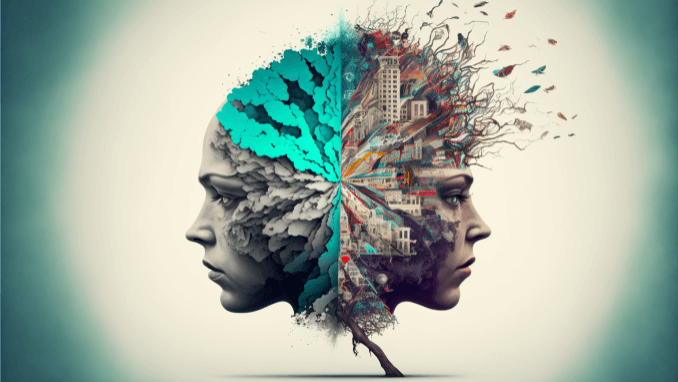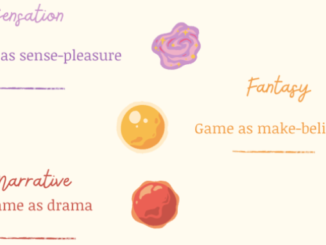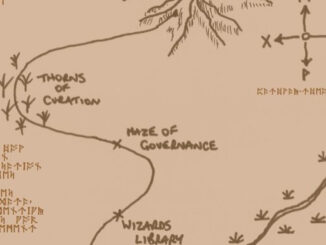
The ‘Magic Circle’ of games enables many things, but one of the most important, from a learning perspective, is the opportunity to encounter experiences which are not your own, to step into the shoes of other people.
At the extremes this can include fantasy experiences – experiencing lives from history, or those that only exist as fictions. More prosaic game experiences have been created that specifically aim to invoke the lived experience of people who one could meet, living on the planet today – potentially with the aim of creating empathy in the player.
The magic circle, being magic, of course, these ideas can be mixed, in whatever proportions are desired, to create game experiences which are both situations one is never going to encounter, and a realistic depiction of real everyday life for some people.
A good example of this is Hellblade:Senua’s Sacrifice, which is both a combat/puzzle game with a fantasy setting, and an experience of psychosis, created with neuroscientists, mental health specialists and people living with the condition.
Hellblade is available on Amazon
As someone who has ADHD, I am particularly interested in depictions of neurodivergent experience and cognitive differences in games, and in the media in general. There is so much opportunity to create understanding, and alongside that, so much need to evaluate the potential both for good and for harm, as well as issues such as representation, ensuring that neurodivergent people have a say in how their experiences are portrayed.
We all live inside our heads, and it is often difficult to understand that other people do not necessarily ‘operate’ in the same way. We have all experienced that shock when someone we know well and like, suddenly reveals through a chance comment, that their values in relation to some issue lie very far from our own. Throughout my life, despite feeling ‘different’ from childhood onwards, I have nevertheless worked on the assumption that the internal experiences of other people were similar to my own. It was only with the realisation that I had ADHD, as an adult, that I began to understand the true extent of the differences in my experiences of both the outside, and inside, world compared to the neurotypical people around me.
Is Point of View important?
Games potentially give us the opportunity to overcome this kind of misconception, by creating ‘other’ experiences and allowing us to step into them. Arguably first-person games are the best vehicle for this. It is notable, therefore, that Hellblade takes a third person visual perspective, despite some of the other sensory aspects of the game e.g. the constant voices which Senua hears, being ‘first person’. Many players have noted this and there are even first person mods which have been created.
For most players, the POV does not spoil the immersion. The game has been widely praised, particularly because it ‘shows’ rather than ‘tells’. It could have given us ‘facts’ about psychosis through text prompts, or even by having Senua tell another character that she ‘hears voices’, but instead it subjects us to a constant uncomfortable soundtrack of whispers.
A less immersive approach is taken in the game ‘Max: An Autistic Journey’, but then the goal here is not stepping into Max’s shoes, but to ‘help explain to everyone a typical day for a ten year old who has autism’. It was developed by Max’s father, Stéphane Cantin.
The game uses a mixture of storytelling, instructive pop-ups which explain aspects of autism and the behaviour of the character of Max, in a number of everyday situations, to give a window into the real Max’s experience.
While both ‘Senua’ and ‘Max’ have the effect of educating, the latter does it more explicitly, and there are many games out there which aim, through immersion or instruction, or a mixture of both, to explain neurodivergent experience, to an audience who does not share those experiences.
For example, Auti-sim, which lets players experience sensory overload, which some people with autism and also some with ADHD can experience. Or the promise of VR and other technologies to allow others to dive into neurodivergent experience.
There are also of course, games which aim to help neurodivergent people navigate the world, as this article from AxonPlay shows, but a broader consideration of neurodivergence even in pure entertainment games, would be good not just for neurodivergent people, but the game industry itself. What that might mean is discussed in this article for Ludogogy about designing with neurodivergence in mind.
But arguably mainstream games are the route to take for wider empathy, understanding and destigmatisation, simply because they don’t require the audience to have a prior interest in being ‘educated’.
So, how is that going?
Well, a bit of a curate’s egg, to be honest. For every Senua’s Sacrifice, Sea of Solitude or In Sound Mind, all of which were developed by or with the help of people with lived experience, there are dozens of games which portray neurodivergence in more problematic ways or are simply ill-informed.
Sea of Solitude is available on Amazon
There are relatively few protagonists or characters in games who are explicitly presented as neurodivergent, so quite often fans have to discover these ‘coded’ characters for themselves. In the case of one of the most celebrated autistic characters in gaming, Symettra in Overwatch, the developers only acknowledged that she was autistic after considerable public fan speculation.
In Sound Mind is available on Amazon
Phoenix Wright in the Ace Attorney games is likewise believed by many to demonstrate many traits of ADHD. And certainly, when I played the game, I really appreciated the game play and many small touches that felt like playing in my own skin, using small details to build a larger problem solving strategy (often prioritising what seem unimportant to others), lateral thinking, his ability to ‘read’ people very accurately, and of course the strong drive for justice and ‘the truth’ which many people with ADHD feel very keenly.

Ace Attorney is available on Amazon
But often neurodivergent coded characters are used in games, and other media in less useful ways. And many neurodivergent people complain that traits which are seen as ‘quirky’, funny or endearing in fictional characters are exactly those which people find hardest to deal with when encountering real neurodivergent people.
In films and TV, this criticism has been levelled at characters such as Sheldon Cooper, or more recently at Jenna Ortega’s portrayal of Wednesday Addams. There are a number of potential problems.
Traits which are recognisable as neurodivergent, are being exploited to produce entertainment, to make a character ‘weird’ or the butt of jokes, which embeds the idea that this is an acceptable way to think about real neurodivergent people, or to regard them as a collection of stereotypical ‘symptoms’ rather than as people just like oneself.
The traits and behaviours displayed are often stereotypical and do not reflect a rounded human being, so characters are just tropes of neurodivergence.
The fact that the characters are ‘coded’ rather than explicit, can be very damaging too, as it allows for ambiguity. Some people see Wednesday Addams as simply rude and socially cold, not autistic. And yet the ‘coding’ allows for these two things to sit side-by-side in public discourse without explicit explanation. Autistic people are not rude and insensitive, but some of them display behaviours which can be interpreted by others in that way. There is an important distinction which is essential to understanding that the outward appearance of neurodivergent behaviour is not the same as inward ‘character faults’.
Both Wednesday and Sheldon exemplify another fundamental problem of representation. These are (very obviously, though coded) neurodivergent characters being portrayed by people without that lived experience. One easy route to better representation would be simply to include a greater number of explicitly neurodivergent characters in games and other media, and to have those characters portrayed by actually neurodivergent people.
And even the games which have received plaudits for their representation tend to share one final overriding characteristic. They tend to fall in the horror genre.
Why are neurodivergent character always in horror games?
Is this a problem – well, like most things, yes and no.
Obviously, it is distinctly unhelpful to perpetuate tropes that present neurodivergent people as ‘monsters’ – a particularly pernicious form of ‘othering’, but how about if they are the protagonists battling for survival – like Senua?
As much as I like to celebrate the positive sides of my ADHD – the creativity, the hyperfocus, there is much about it that is debilitating, and, yes, on occasions, even horrific – sensory overload, rejection sensitivity, lack of sleep. Many neurodivergent people report that playing horror survival games are therapeutic or cathartic – helping them to reflect usefully on their lived experience.
So it is not necessarily the fact that neurodivergent characters tend to populate horror games which is the issue, but the fact that they are relatively rare elsewhere. It is an issue of representation – as if neurodivergence only has one story to tell, and it is a story of surviving horror.
If you imagine a TV show about a team of talented and dedicated investigators, and the only time that a Muslim character ever appears is if the creators of the show want to tell a story about terrorism. This happens quite a lot, but it does (and should) make many people uncomfortable when they see it.
We should feel the same kind of discomfort when we see yet another horror survival game peopled with ‘quirky’ characters, and ask ourselves “What about all the other stories this beautiful diversity of mind could tell us?”
- James Bore – The Ransomeware Game - 13th February 2024
- Ipsodeckso – Risky Business - 23rd January 2024
- Review – Luma World Games - 15th December 2023





Be the first to comment